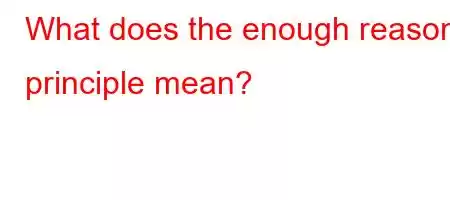What does the Object Enough reason principle mean?
Contents
What does the principle of enough reason mean?
The principle of sufficient reason is the thing that practically carries and supports all our relations with the world without any doubt, the order in the world and the univocity, the rule. It is the answer given to a question that makes our knowledge of the law and the law theoretically problematic.
Who owns the principle of enough reason?
Although the principle of enough reason has been used by many philosophers and scientists, he did not use this principle.
What is necessary cause and sufficient reason?
The principle that Leibniz put next to the principle of non-contradiction as the main principle of thinking . The most general form: everything has a sufficient reason. As a principle of logic: Every judgment needs a sufficient reason to be true.
Leibniz's enough reason principle?
Melih Gümüş's Enough Reason Principle The sufficient reason principle is that everything in the universe is interconnected He argues that everything exists, affects each other, and as a result of these, everything that exists has a cause. Everything that exists is the result of a cause, nothing can exist without a cause.
The principle of sufficient reason is an example?
“A person is either dead or alive” There is no third possibility. “Electricity either exists or it does not exist” cannot exist and not exist at the same time. No judgment is true without sufficient reason, in other words, every judgment must have a sufficient reason.
What are the necessary and sufficient conditions for the existence of a sentence?
The formation of the sentences requires a conjugated verb or a noun conjugated word with an additional verb. Words that have the properties of either of these two elements will be sufficient to form the sentence.
What is the condition, mathematics?
The Concept of Enough Condition in Formal Logic Language. In the conditional proposition p → q, the proposition p is called the premise, and the proposition q is called the conclusion (or successor). In this conditional statement, the premise(p) is a sufficient condition for the conclusion(q). Such that, whenever the premise is true, the conclusion is necessarily true.
What does a necessary condition mean?
Each of the necessary conditions for something to be true.
< /p>
Read: 198


